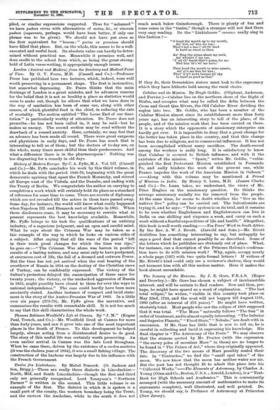Calabar and its Mission. By Hugh Goldie. (Oliphant, Anderson, and
Ferrier.)—Calabar lies on the northern shore of the Bight of Biafra, and occupies what may be called the delta between the Cross and Great Qua Rivers, the Old Calabar River dividing the region into two. Mr. Goldie, who has been a member of the Calabar Mission almost since its establishment more than forty years ago, has an interesting story to tell of the place, of its people, and of the mission work that has been carried on there. It is a story which the opponents of missionary enterprise can hardly get over. It is impossible to deny that a great change for the better has taken place in the country, and that this change has been due to religious, not to commercial influences. It has not been accomplished without many sacrifices. The death-record among the workers is sadly long. It is satisfactory to know that Calabar is secured to British influence, and with it the existence of the mission. " Spain," writes Mr. Goldie, " extin- guished the first Protestant Mission established in Fernando Po, and sadly hinders the work of the present one, while France impedes the work of the American Mission in Gaboon." —Along with this volume may be mentioned A Friend of Missions in India. By Henry S. Lunn, M.D. (James Clarke and Co.)—Dr. Lunn takes, we understand, the views of Mr. Price Hughes on the missionary question. He thinks the average missionary socially too far removed from the people. At the same time, he seems to doubt whether the " live as the natives live" policy can be carried out. The Salvationists are trying it, and he says : " Their system is on its trial, and it remains to be seen whether Englishmen and Englishwomen can live in India on one shilling and sixpence a week, and carry on such a work without a fearful expenditure of life and health." Altogether, this book is well worth reading.—Ten Years' Work in South Africa. By the Rev. A. W. J. Rivett. (Jerrold and Sons.)—Mr. Rivett doubtless has something interesting to say, but unhappily he says a good deal that cannot possibly be so described. Some of the letters which he publishes are obviously out of place. What, for instance, can a description of the Princess Helena's confirma- tion have to do with mission work ? Why, again, occupy nearly a whole page (197) with two quite formal letters ? If writers of Mr. Rivett's kind could only see a reviewer's shelves, they would not torment him with all this useless matter. Here it makes the book almost unreadable.


















































 Previous page
Previous page